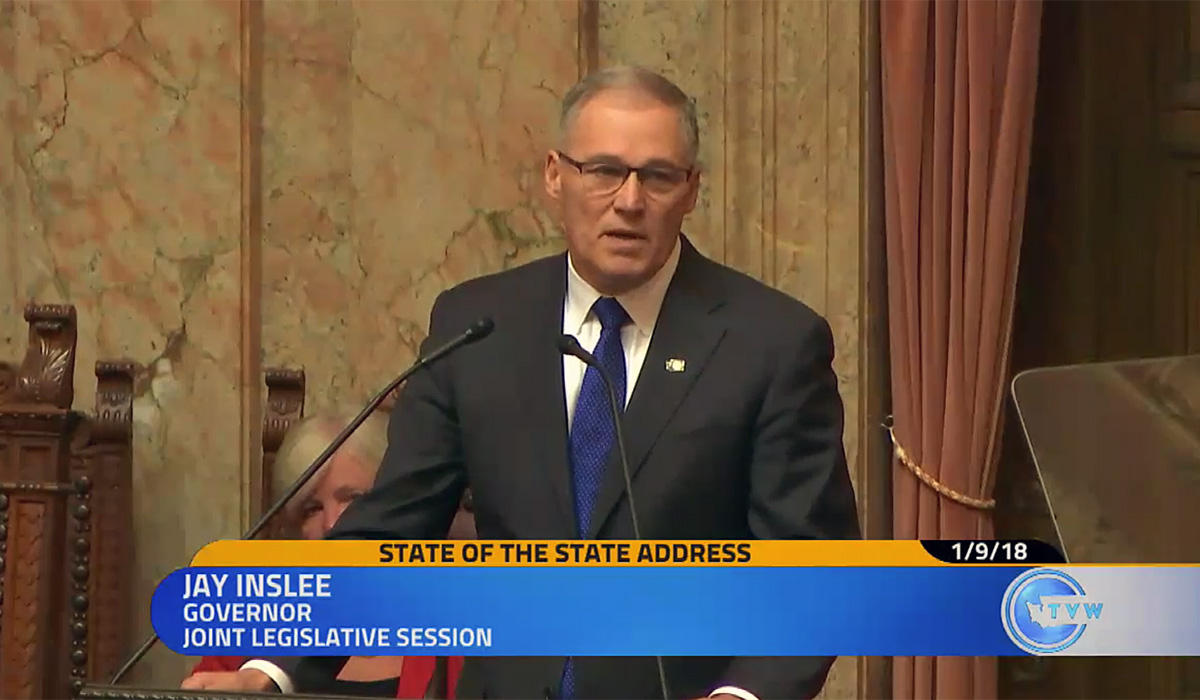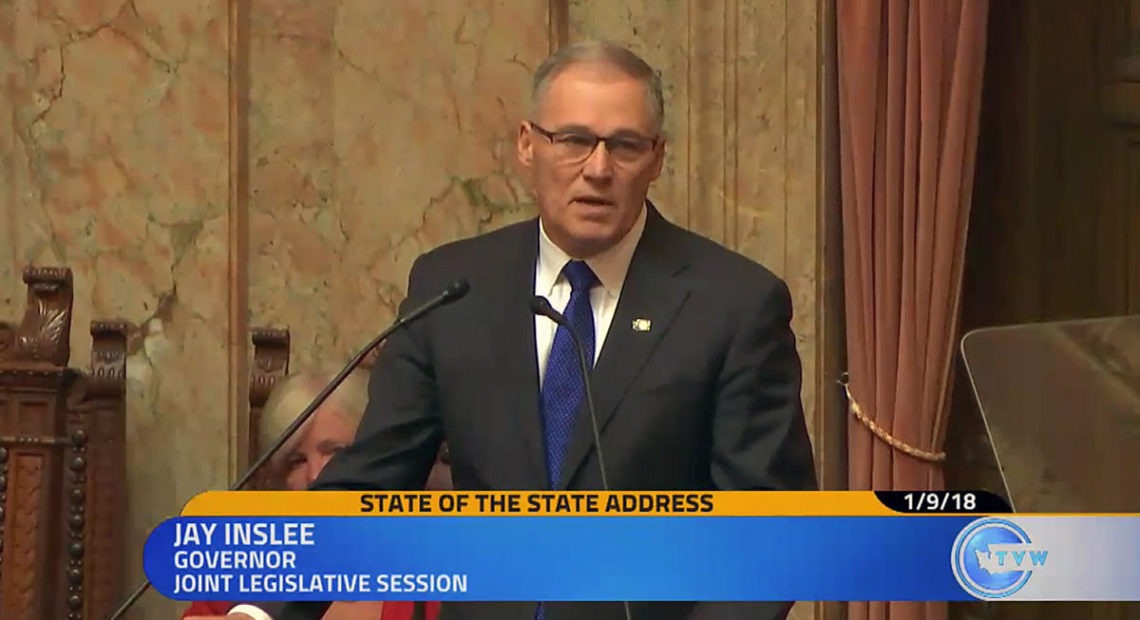
Jay Inslee Proposes New Version Of Carbon Tax
Listen
Washington Gov. Jay Inslee is making another push for a state carbon tax. The Democrat unveiled his latest proposal Tuesday during his State of the State address.
Under Inslee’s plan, industrial carbon emissions would be taxed at $20 per ton starting in 2019. After that the tax rate would increase by 3.5 percent, plus inflation annually. The tax would raise an estimated $3.3 billion over the first four years.
During his speech, Inslee urged lawmakers to pass the carbon tax this year.
“Doing so will allow us to reinvest in all the things that drive down emissions,” he said. “We can build more solar panels. We can put more electric cars on the road. We can help more Washingtonians purchase energy-saving insulation for their homes and businesses.”
Under his plan, Inslee would dedicate 50 percent of the carbon tax revenues to clean energy projects, 35 percent to “resilience” projects including flood control and forest health and 15 percent to help low-income communities and displaced workers. In December, Inslee also proposed to use carbon tax revenues on a one-time basis to replenish state reserves he wants to tap to cover a nearly $1 billion shortfall in education spending for the 2018-19 school year.
Several hundred businesses operating in Washington would pay the tax, including utilities and oil companies. Energy intensive and trade-exposed industries could petition for an exemption from the tax.
Last year, executives from Kansas-based Ash Grove Cement testified against a different carbon tax proposal in the Legislature calling it the equivalent of a “death warrant” for the company’s Seattle plant.
“[It’s] putting facilities like us, heavily trade-exposed, energy-intensive industries on death row,” said Curtis Lesslie, the vice president of environmental affairs for Ash Grove.
Republicans have also criticized the idea of a carbon tax as bad for business and consumers.
“A new tax on energy in Washington state will drive jobs out of here,” said state Sen. Doug Ericksen, the ranking Republican on the Senate energy committee.
Senate Minority Leader Mark Schoesler called it a “bait and switch” and state Rep. Drew Stokesbary said Inslee is trying to pick “winners and losers.”
“He wants a $1.5 billion slush fund that he can hand out to Solyndra 2.0 based in Sequim, Washington, or wherever so that he can continue to pick winners and losers for as long as he’s governor,” Stokesbary said. “And I don’t think that’s the right approach for Washington.”
Solyndra was a solar cell company that went out of business in 2011 after getting a federal renewable energy loan.
Inslee insists a tax on carbon would create jobs by fueling a clean energy economy in the state. However, the governor’s staff also acknowledged that Washington consumers would pay more in fuel and energy costs if a carbon tax is enacted. That includes a 5 percent average increase in residential electricity prices and a 10 percent increase in residential natural gas prices. The price of a gallon of gasoline could go up 18 cents, according to the governor’s initial modeling.
Inslee noted that British Columbia and California already price carbon and Oregon is considering it. But passage of a carbon tax in a short, 60-day election year session appears to be a longshot in Olympia—even with Democrats in control of both the House and Senate.
But there is a wildcard factor: the potential for carbon tax ballot measures in 2018 backed by tribal, labor and environmental interests. The threat of initiatives could bring the business community to the negotiating table at the Legislature.
Last year, Inslee proposed a similar carbon tax as part of his plan to fully fund schools. Under that proposal, 50 percent of the revenues would have gone to K-12 education. Instead lawmakers adopted a new state property tax levy to fund schools.
In 2014, Inslee unveiled a “cap-and-trade” proposal designed to raise about $1 billion per year with nearly half the proceeds to fund transportation projects. That proposal died in the 2015 legislature.
Since his days as a member of Congress, Inslee has made combating carbon emissions and global climate change a signature issue. He even wrote a book about it titled “Apollo’s Fire: Igniting America’s Clean Energy Economy.”
A 2008 law requires Washington to reduce greenhouse gas emissions to 25 percent below 1990 levels by 2035 and 50 percent below 1990 levels by 2050. Projections show the state is not on target to meet those reductions.
There are proposals in the Washington Legislature this year to set more ambitious goals for carbon emission reduction that align with the 2015 Paris climate agreement.
Inslee also called on the Legislature to address voting rights, education funding and gun control over the 60-day session. In their response to Inslee’s speech, minority Republicans accused the governor of not being sensitive enough to concerns in rural communities.
The governor used the speech to draw a contrast with Washington D.C. He accused the Trump White House of divisiveness, disorder and disrespect. He called on the people of Washington state to stand up for civility, tolerance and liberty.
“We will fight to protect Washingtonians’ health care, women’s right to choose, the right for people to be safe from discrimination, and the right to clean air and water,” Inslee said. “We will not be intimidated. It’s important to know that.”
Copyright 2017 Northwest News Network
Related Stories:
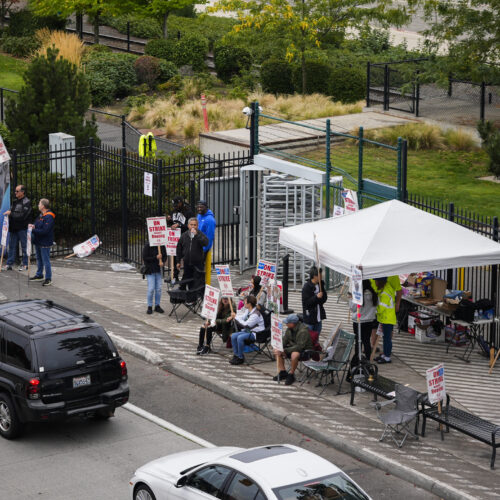
Striking workers in Washington could get access to unemployment claims if bill passes
A proposed bill that would give striking workers some access to the state’s unemployment benefits is getting closer to becoming law in Washington.
Majority lawmakers in the House Committee on Labor & Workplace Standards moved the bill out of committee on Friday, with a recommendation to pass it. This, after the bill narrowly passed the senate with 28 yeas and 21 nays earlier this month.
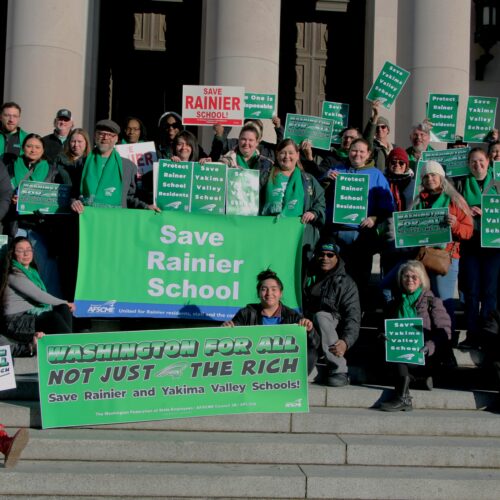
State considers closure of residential facilities for people with disabilities
Ever since he started working at Rainier School in Buckley, Washington, Willis McNabb has been hearing that the state was going to close it. This time, he said it feels more real.
“I’ve never been so worried as I am today,” McNabb said.
Since 1991, McNabb has worked at Rainier, which gives people with intellectual and developmental disabilities a place to find community, learn, work and receive comprehensive health treatment.
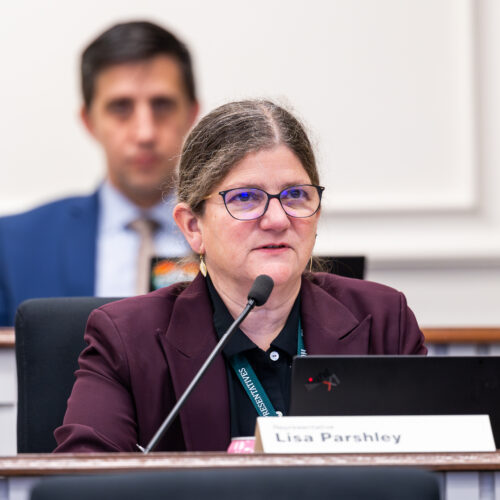
Washington bills attempt to give public workers power to bargain on AI
There are only so many things employees get to have a say over in their jobs. Which laptops or messaging app your office uses might not be your call.
For a while, decisions on the use of technology in the workplace have been up to management for public workers in Washington state, thanks to a law passed in 2002. But now, some lawmakers want to pass an exemption that would allow public sector employees to bargain on one broad and ever-changing technology — artificial intelligence.

